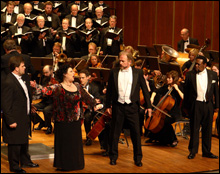
ATTILA: here wasn’t a dull second — only the supertitles snoozed.
|
Things go from bad to worse. Last year, Jeffrey Rink’s Chorus pro Musica gave us Philistines; this year it was Huns, Goths, and Vandals. Last year: seductive belly wriggling; this year: “screams, rape, moans, blood, pillage” and the desire to “feast on limbs and severed heads.” Last year it was Saint-Saëns’s Samson et Dalila; this year Verdi’s Attila, in its New England premiere. I’ve been more than impressed with the way Rink handles opera — and especially Verdi. Attila, Verdi’s ninth opera, the one right before Macbeth (which Rink did in 2001), was still five years and eight operas away from his first unqualified masterpiece, Rigoletto. It doesn’t have Verdi’s most probing or memorable music. But it’s got profile — Verdi’s inimitable vitality, soaring arcs of melody, grand and characterful choruses, and many hints of greater things to come in music that flatters the singer who can sing it well. It’s also got passion. In 1846, the movement for Italian unification was heating up, and this is an opera about Italian patriots saving their Motherland from the Huns.The Chorus itself shone as both ravenous Germanic cannibals and fervent hermits (I guess Verdi never saw the illogic of a group of hermits), and that was especially important because Verdi structures this opera around contrasting choruses. Rink’s superb orchestra played not only with unflagging energy but also with finesse. He shaped those musical arches and made every change in tempo tell. There wasn’t a dull second. (I’d suggest, however, that CpM needs a supertitle projectionist who doesn’t fall asleep at the wheel.)
In a cast of singers with the classiest credentials — Metropolitan Opera, New York City Opera, Covent Garden, Bayreuth — the only one who gave me chills was Boston’s own Robert Honeysucker, whose suave and ringing baritone just gets more beautiful and powerful. If you heard a recording of him as the Roman general Ezio, singing Verdi’s patriotic hymn to Rome, you’d think he was up there with Leonard Warren back in the Golden Age of opera. (Next season, he’ll be in Opera Boston’s production of Bizet’s The Pearl Fishers, singing in what may be the most beautiful duet ever written for two men.)
In the title role, bass-baritone Stephen West gave the fullest characterization to the most fully characterized part in the opera. The King of the Huns is a ruler of both swaggering power and justified fears. He has bad dreams that come true. He shows kindness to his enemies and even falls in love with one of them but of course is betrayed. West has a strong, rough voice that’s perfectly appropriate here. And he caught the dramatic nuances.
Less subtle in a role less subtly drawn was soprano Paula Delligatti, whose greatest previous visibility in Boston was in the title role of the BSO’s elaborately semi-staged 1999 performances of Madama Butterfly, which Seiji Ozawa conducted. I remember her singing being lovely and also being left cold by her. Odabella, the captive Italian Amazon warrior who ends up marrying Attila so she can stab him to death, doesn’t have to make you sigh and cry. She’s a tough, cold-blooded bit of cannoli. Delligatti has technique, pitch, and a pretty voice, though one that doesn’t have the heft throughout its entire range to hurl out Odabella’s ferocity, especially in her big vengeance aria, “Allor che i forti corrono” (“While your warriors rush”), Verdi’s most ambitious soprano aria to date and no piece of cake.